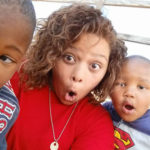9/5/03
U.S. overlooks Africa's 'twin towers'
By Richard Stearns
The Sept. 11, 2001, terrorist attacks on the United States proved the mettle of the American people. We are strong. We are brave. We are a people of faith. And we are generous and compassionate.
Few of us will be called upon to prove our strength by rushing into a burning building. Fewer still to prove our bravery by commandeering a hijacked airplane. But all of us can demonstrate our compassion by helping widows and orphans in need.
Seven out of 10 Americans gave to help families of the thousands of people killed in the attacks on the Pentagon and World Trade Center's twin towers. But there's another “twin tower” disaster that has been all but ignored by the American people–Africa's AIDS crisis.
| Richard Stearns |
I received a list of children who had lost one or both parents to AIDS in just nine villages of the southern African country of Zambia. The list of 3,613 names, 10 to a page, was 3 inches thick. I calculated that a list of all of the African children who have lost parents to AIDS–at least 12 million–would be more than 90 stories high.
| Americans are not unaware of the toll AIDS is taking on Africa. We just choose to look away. |
Next to that, put a similar list of 28 million Africans infected with HIV, the virus that causes AIDS; that list would reach 194 floors–84 stories taller than the World Trade Center. Many of the names would be of widows, infected by their husbands with the disease, wishing for nothing more than to stay alive long enough to raise their children.
Unlike New York's twin towers, which collapsed before the eyes of the world, these towers have been building slowly, inch by inch, for the past two decades–not on global television, but in anonymous slums and villages.
That's not to say that Americans are unaware of the toll AIDS is taking on Africa. We just choose to look away.
A poll conducted by the Barna Research Group found that about three-quarters of the American public is aware that many countries have a large population afflicted by AIDS. Nearly a third said they were “very familiar” with the AIDS crisis.
The same survey found that more than half of the public is unlikely to help children who have lost parents to AIDS. Almost two-thirds said they are unlikely to help overseas AIDS prevention and education programs–efforts that can protect wives from being infected by their husbands and young people from experiencing the same fate as their parents. Only 8 percent said they would definitely support these causes.
Regrettably, evangelical Christians were significantly less likely than non-Christians to support AIDS education and prevention. And although they are usually twice as likely as adults overall to support disadvantaged children overseas, they were less likely to support children orphaned by AIDS.
Why would fewer than one in 10 Americans be willing to help widows and orphans of AIDS, while seven out of 10 were moved to help those who lost mothers, fathers, wives and husbands in the Sept. 11 attacks?
Sept. 11 saw the first direct attack on the United States in nearly 60 years. The deaths of thousands of our countrymen in three short hours also were unprecedented.
More compelling than the terrible ways in which they died was the ordinariness of their lives as they started the day. They commuted to work. They got on airplanes. They sat at their computers, coffee cup to the right, pictures of their kids to the left–just like us.
In short, we all can relate to the people who died on Sept. 11. We feel compelled to care for their families like they were our own. As we should.
Africa's AIDS crisis, by contrast, has been slowly building over the years. Those affected live in villages, even countries, we cannot locate on a map–or even pronounce. Most are poor. Their cultures are different. The way men and women relate to one another is different. And so we turn away from what we do not understand.
But while we turn away, the “twin towers” of those affected by HIV/AIDS continue to grow. By the end of this decade, Africa alone could have 40 million children who have lost parents to AIDS. That list would stack up high enough to make three of the New York twin towers.
Sept. 11 proved it is impossible for the United States to ignore the world's problems. We were outraged by the oppression of women under the Taliban, and even moved by abuse and neglect of animals at the Kabul zoo. We are more aware of world events than we have been in decades.
We are a different country than we were prior to Sept. 11, 2001–stronger, kinder, more internationally savvy. Our new awareness of the world should lead us to extend the same respect and compassion to the widows and orphans of Africa's AIDS epidemic as we have to survivors of America's greatest tragedy.
Richard Stearns is president of World Vision United States, one of the world's largest Christian humanitarian organizations. His column is distributed by Religion News Service














We seek to connect God’s story and God’s people around the world. To learn more about God’s story, click here.
Send comments and feedback to Eric Black, our editor. For comments to be published, please specify “letter to the editor.” Maximum length for publication is 300 words.